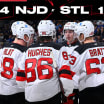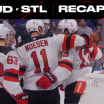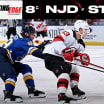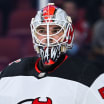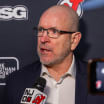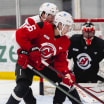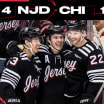"We were doing something no one else was prepared to do." --
Ex-NHL player Gerry Pinder who jumped to the World Hockey Association.
If what I'm about to tell you about a New Jersey hockey team that wound up with the third of three different names, you'd assure me that it never could have happened.
And I wouldn't have blamed you. But this Incredible-But-true tale did happen; and right before my very eyes; first at Madison Square Garden and then Cherry Hill, New Jersey.
The chapter would be titled "How The New York Raiders Became The Golden Blades Who Became The Jersey Knights And The Garden State Wished It Had Never Happened."
How Jersey Got the Golden Blades, And Wish It Had Not | SUNDAYS WITH STAN
From Raiders to Golden Blades to Jersey Knights to California
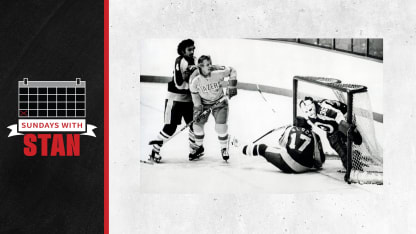
By
Stan Fischler
Special to NHL.com
Put the blame on the World Hockey Association, if you will. Or take the words of author Ed Willes who wrote Rebel League, all about the WHA's rise and inevitable fall.
"In the WHA," wrote Willes, "you just tried to make it to the next game."
And that, dear Devils fans, is how WHA teams felt about their future. In this case we're talking about a bunch of pros who wound up playing in Cherry Hill and were renamed the Jersey Knights. Like their rebel league brethren, the Knights just tried to make it to the next game.
Then again, I should tell you that there never would have been any Knights nights in New Jersey had there previously not been New York Raiders afternoon games and Golden Blades nights at Madison Square Garden.
If blame or praise is to be doled out it would have to start with the WHA's introductory meeting in October 1971 at Manhattan's Americana Hotel. I covered that event for The Hockey News because it was a good story. Hey, a new "major" league was born.
It began as a 12-team circuit with teams in such burghs as Boston, Philadelphia, Houston and a bunch in Canada. But if the WHA was to be truly regarded as "big-time," it needed a team in The Big Apple.
Originally, the brand-new Nassau Veterans' Memorial Coliseum in Uniondale, Long Island was considered close enough for a WHA "New York" team. Lawyer Neil Shayne bought the proposed WHA franchise for that very reason.
And Shayne might have succeeded had the NHL not heard about his plans. Strings were pulled and the next thing Neil knew was that the NHL had aced him out by placing the Islanders in the new Coliseum.
Dismayed, Shayne sold his franchise to a young New Jersey lawyer named Dick Wood who went one county better. Wood met with Rangers president Bill Jennings about putting his WHA team in Madison Square Garden. Jennings said "Okay" and they talked.
Wood thought he had a deal when Jennings told him that MSG's rental fee would be $1,700 for a Sunday afternoon game. That sounded rather reasonable; except for one big thing. "There were costs at The Garden they didn't tell us about," moaned Wood.
It involved paying the many MSG unions for various jobs and when the costs were totaled it came to about $20,000 per game. Pleas to the union found deaf ears along with the dubious rationale, "We have to have full staff in case there's a sellout."
That got a good laugh because the WHA never came close to filling every seat in MSG. Tough luck for Wood who already had signed for the arena and also had a team which he named The New York Raiders.
Ed Willes: "Wood would get fleeced in that particular (MSG) deal, but he would also leave the WHA just one year later as the only owner to make money in the rebel league."
Having covered Raiders games at MSG, I remember them being exciting and with enough former NHLers to give at least the patina of major league.
Former Rangers idol Camille Henry coached the Raiders who remained competitive and even produced a surprisingly productive scorer. Ron Ward had been a Vancouver Canucks defenseman who had been converted to forward by Henry and a star was born.
Nicknamed "Magic," Ward scored 118 points and even gained a feature profile in Sports Illustrated magazine; which, in those days, was a big deal. But, aside from ex-NHLers, Bobby Sheehan, Norm Ferguson and Wayne Rivers, the Raiders lacked a true NHL marquee name.
"At the end of the first year," Willes remembered, "Wood unloaded the Raiders to an investment group and turned a tidy profit. For the 1973-74 season the new group renamed the next Garden WHA entrant The Golden Blades and attempted to market the little French-Canadian sniper Andre Lacroix as its star."
They also widely advertised a pre-season MSG hockey jubilee with assorted WHA marquee names such as Gordie Howe, Bobby Hull and Gerry Cheevers among the featured performers. That extravaganza failed along with a missed Golden Blades payroll early in the season. Yup, once again there was trouble in River City.
When, by December, the team was skating on thinner than this fiscal ice, the WHA took control of the franchise and needed an orderly retreat to escape the excessive MSG rental. Searching for a cheap rink, the league settled for New Jersey and the notorious Cherry Hill Arena in the shadows of Philadelphia
A season earlier it had been home to the Eastern League's Jersey Devils. But when the league folded so, too, did the original Devils. Now the Knights tried their luck in Cherry Hill, which then was as far from major league as the Planet Saturn.
Yet that's where the WHA Jersey Knights were knighted with former Raiders executive Marvin Milkes imported as general manager. Meanwhile, the franchise was sold by the WHA to a Baltimore businessman named Joseph Schwartz.
Willes: "In its remarkable two-year history the franchise would be known by three different names, owned by five different groups and managed by three different men. The Knights now were playing in what likely was the worst facility in the history of major league professional sports. It was the only rink in North America that featured (ski) moguls on its ice surface."
But a rink by any other name still was a rink and now the Jersey Knights had a season to finish, which they did; but not without incident. Howard Baldwin, who would become WHA president, called Cherry Hill Arena, "a shrine," because "it was a rink; it was pro hockey."
Members of the media took a dimmer view mostly because of its "press box," which consisted of a tiny gondola perched over the stands. In his autobiography, "Slim and None," Baldwin described the press box this way:
"To get in you had to climb up a ladder like a fire escape and then you had to duck because the ceiling was very low."
Rod Philips, the Edmonton Oilers radio play-by-play announcer, once broadcast an Oilers-Knights game in Cherry Hill. His report back to Alberta was, "The press box is so small you had to stand up to do a game. And when someone shut the door, it cut off the whole end of the rink."
While that might sound amusing it wasn't funny to Toronto Toros owner John Bassett. A daring sportsman, Bassett wanted to ace out the NHL. His plan was to sign Montreal's "retired" goalie Ken Dryden. This was the year that the future Hall of Famer took leave of the Canadiens in a contract dispute.
Bassett had hired Dryden as the Toros TV analyst which meant that Ken had to visit Cherry Hill when the Toros played the Jersey Knights.
Baldwin: "It took Ken - a big fellow - almost half an hour just to squeeze into the ridiculous press gondola. When Dryden finally fitted into his seat he looked around and said, 'There's no way I'm playing in this league. No way!'"
Bassett put it another way: "That (darn) New Jersey rink cost me my goaltender!"
Like the Golden Blades, the Knights also had hoped that super scorer Andre Lacroix would spur ticket sales, but the fact of the matter was that his name wasn't Howe nor Hull.
All challenges considered, the Knights still made a valiant run at a playoff berth but a late season slump left them with a 32-42-4 record; not good enough for postseason play.
The Knights last owner, Joseph Schwartz, decided that - once and for all - the team needed a more stable home with a decent arena. After the tumultuous 1973-74 season, he moved his New Jersey franchise to San Diego.
That city's sports arena was relatively large and relatively new, but not relatively clean. The washrooms, for one thing, were described as "despicable" and by 1974 San Diego's WHA franchise had folded.
In retrospect, the franchise that went from Raiders to Golden Blades to Jersey Knights had a fitting ending in far off California; it still smelled bad.
As for those of us - Me included - who handled games at Cherry Hill's ignominious arena, I can only conclude that both the contests and ambience were somewhat to the left of normal.
Or, as author-historian Willes concluded about WHA hockey in a New Jersey suburb, "Makes sense. It wasn't a normal league!"

